
 MASS OF THE EPIPHANY
MASS OF THE EPIPHANY
AND EPISCOPAL ORDINATIONS
Adapted from

January 6, 2013
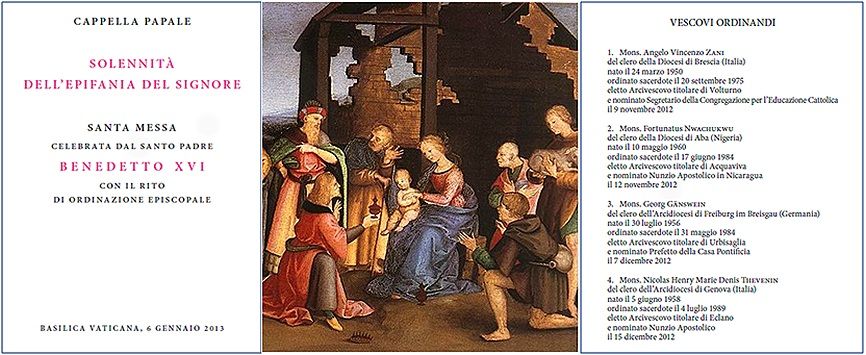 Libretto cover: Adoration of the Magi (detail), Raphael, 1502-1504, Loggia Raffaele, Vatican Apostolic Palace.
Libretto cover: Adoration of the Magi (detail), Raphael, 1502-1504, Loggia Raffaele, Vatican Apostolic Palace.
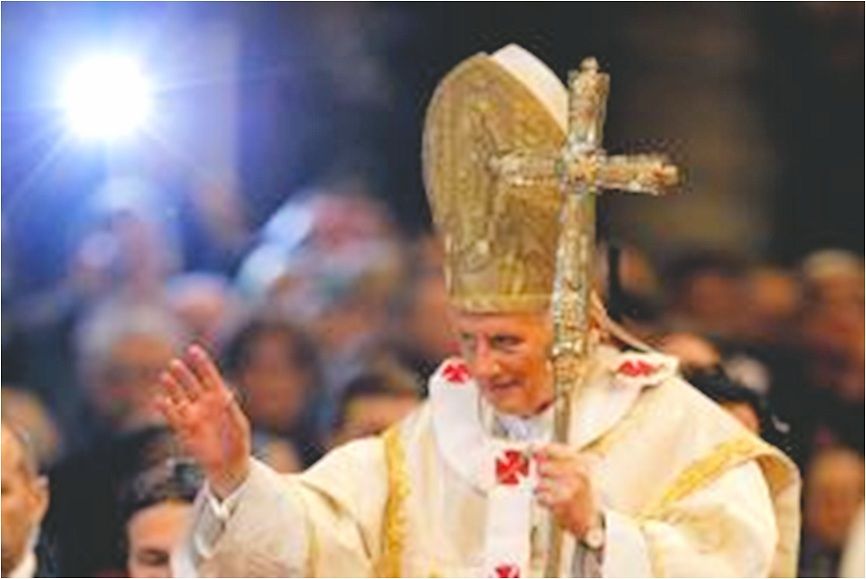
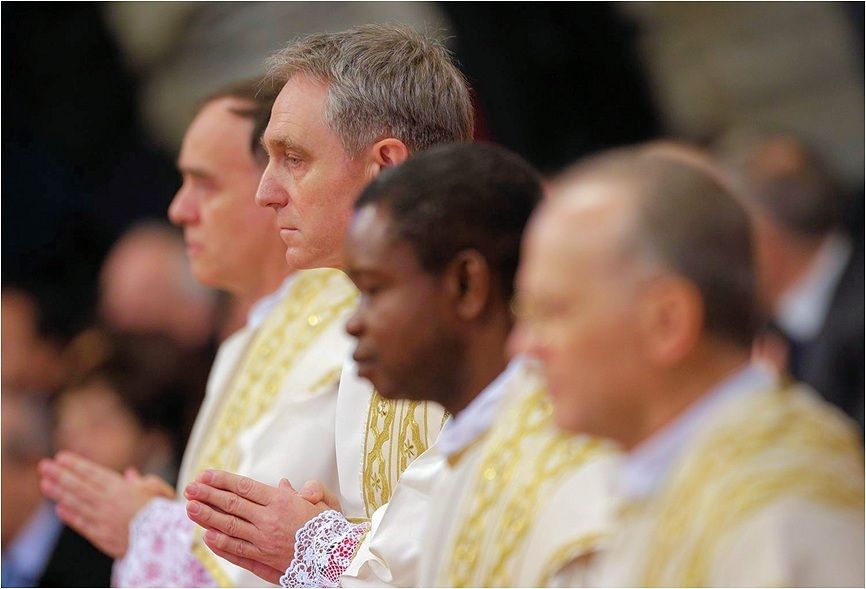
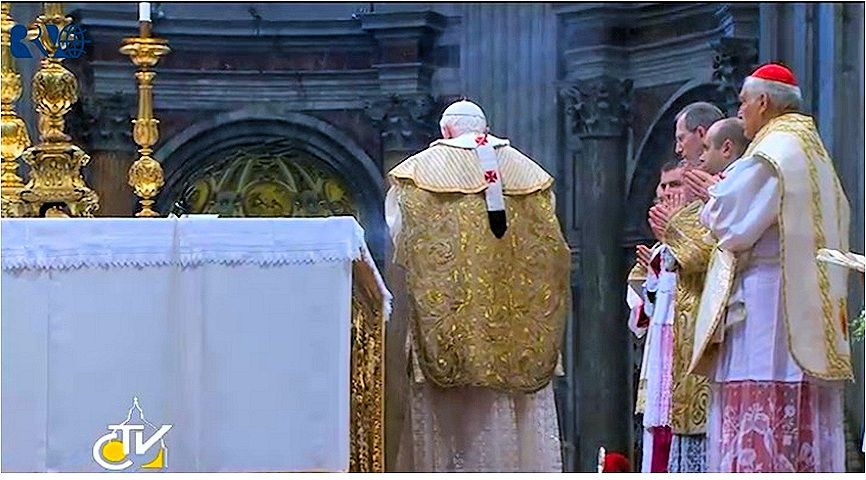
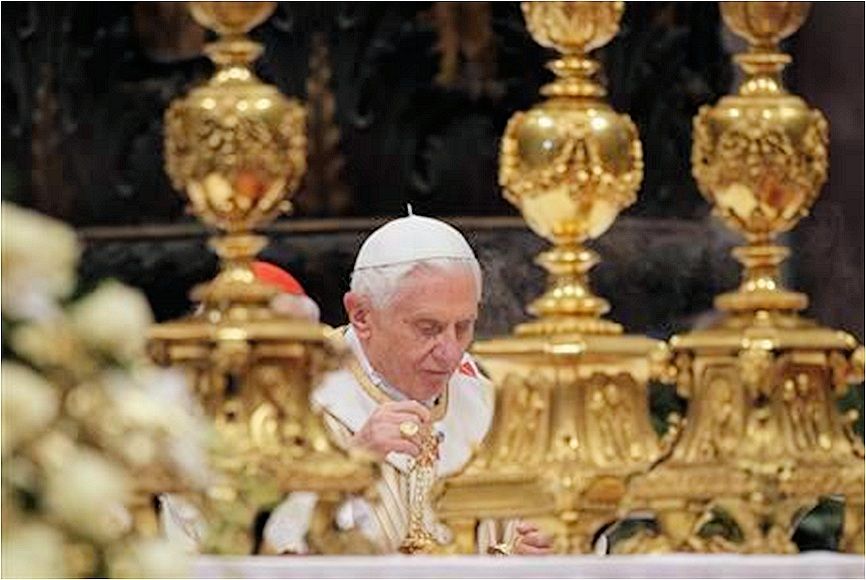
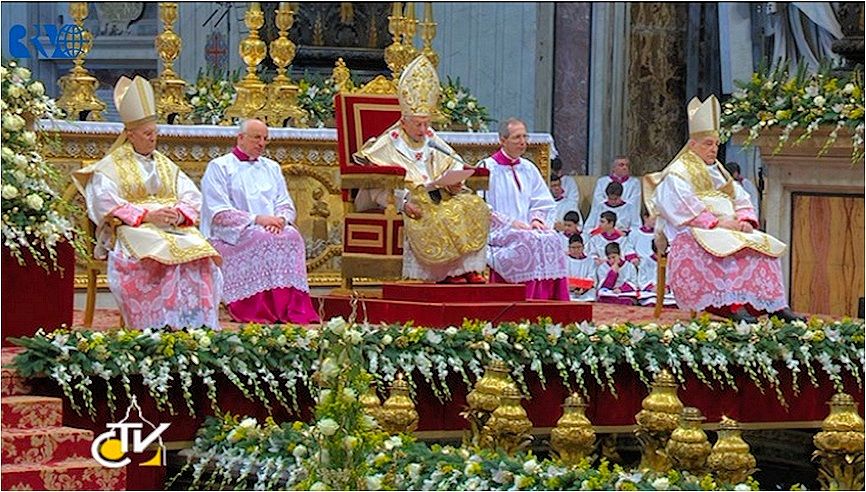
Following a tradition begun during the Pontificate of Blessed John Paul II, Pope Benedict XVI today ordained four new bishops in the service of the Holy See at the Mass of the Epiphany in St. Peter's Basilica.
All elevated to the rank of Archbishop recently, they are, in the order of their nominations: Angelo Vincenzo Zani Italy), Secretary of the Congregation for Catholic Education, nominated Nov.9; Fortunatus Nwachukwu (Nigeria), Apostolic Nuncio to Nicaragua, both nominated Nov. 12; Georg Ganswein (Germany), Personal Secretary to Pope Benedict XVI and Prefect of the Papal Household, nominated Dec. 7; and Nicolas Thevenin (Italy) , also Apostolic Nuncio in the Diplomatic Service of the Holy See, nominated Dec. 15.
Concelebrating with the Holy Father were Cardinal Secretary of State Tarcisio Bertone and Cardinal Zenon Grocholewski, Prefect of the Congregation for Catholic Education. who were also the principal consecrators after him, and the four new bishops.
Also at the Mass, the date for Easter 2013, March 31, was officially announced.It is the movable feast by which all other moveable feasts during the liturgical year are dated.
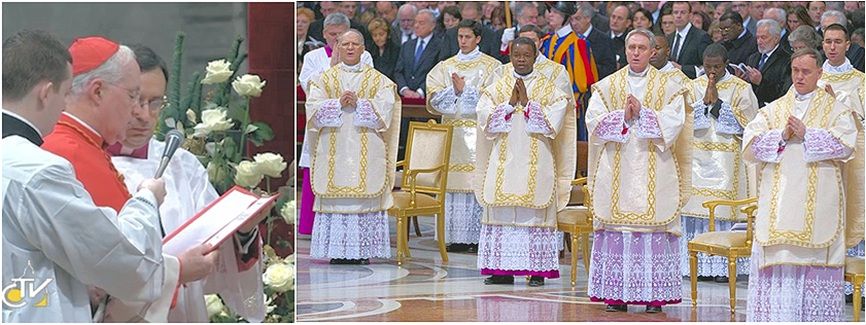
Before the homily, Cardinal Marc Ouellet, Prefect of the Congregation for Bishops, formally asked the Holy Father to accept the four ordinands into the Episcopate, to which he replied formally, "Most willingly". The ordination rite itself would follow the homily.
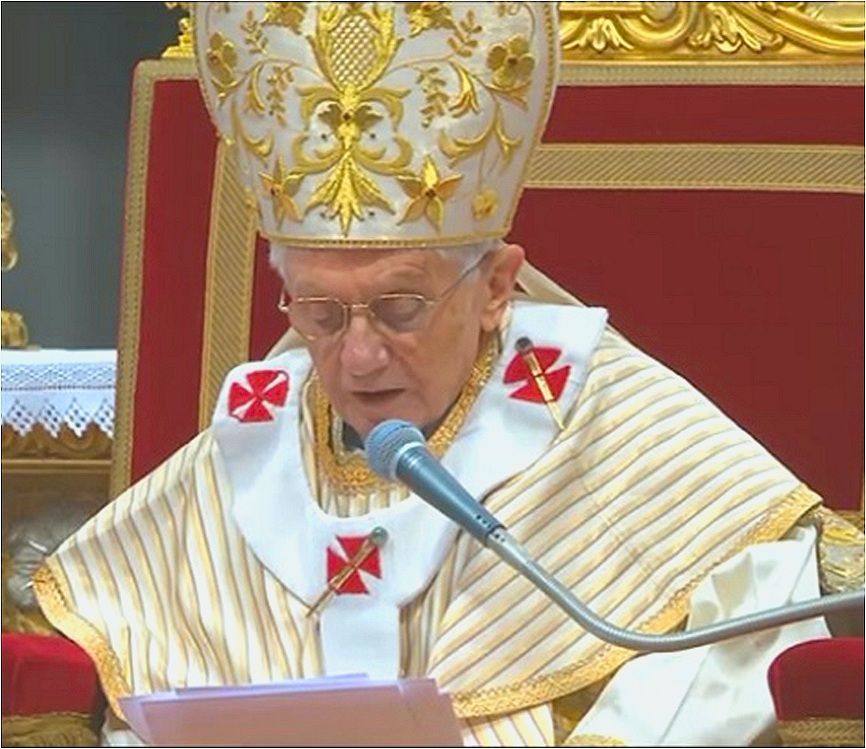
Here is the Vatican's official translation of the Pope'e homily:
Dear Brothers and Sisters,
For the Church which believes and prays, the Wise Men from the East who, guided by the star, made their way to the manger of Bethlehem, are only the beginning of a great procession which winds throughout history.
Thus the liturgy reads the Gospel which relates the journey of the Wise Men, together with the magnificent prophetic visions of the sixtieth chapter of the Book of Isaiah and Psalm 71, which depict in bold imagery the pilgrimage of the peoples to Jerusalem.
Like the shepherds, who as the first visitors to the newborn Child in the manger, embodied the poor of Israel and, more generally, those humble souls who live in deep interior closeness to Jesus, so the men from the East embody the world of the peoples, the Church of the Gentiles – the men and women who in every age set out on the way which leads to the Child of Bethlehem, to offer him homage as the Son of God and to bow down before him.
The Church calls this feast "Epiphany" – the appearance of the Godhead. If we consider the fact that from the very beginning men and women of every place, of every continent, of all the different cultures, mentalities and lifestyles, have been on the way to Christ, then we can truly say that this pilgrimage and this encounter with God in the form of a Child is an epiphany of God’s goodness and loving kindness for humanity (cf. Tit 3:4).
Following a tradition begun by Pope John Paul II, we celebrate the feast of the Epiphany of the Lord also as the day when episcopal ordination will be conferred on four priests who will now cooperate in different ways in the ministry of the Pope for the unity of the one Church of Jesus Christ in the multiplicity of the Particular Churches.
The connection between this episcopal ordination and the theme of the pilgrimage of the peoples to Jesus Christ is evident. It is the task of the Bishop in this pilgrimage not merely to walk beside the others, but to go before them, showing the way.
But in this liturgy I would like to reflect with you on a more concrete question. Based on the account of Matthew, we can gain a certain idea of what sort of men these were, who followed the sign of the star and set off to find that King who would establish not only for Israel but for all mankind a new kind of kingship.
What kind of men were they? And we can also ask whether, despite the difference of times and tasks, we can glimpse in them something of what a Bishop is and how he is to carry out his task.
These men who set out towards the unknown were, in any event, men with a restless heart. Men driven by a restless quest for God and the salvation of the world. They were filled with expectation, not satisfied with their secure income and their respectable place in society. They were looking for something greater.
They were no doubt learned men, quite knowledgeable about the heavens and probably possessed of a fine philosophical formation. But they desired more than simply knowledge about things. They wanted above all else to know what is essential. They wanted to know how we succeed in being human. And therefore they wanted to know if God exists, and where and how he exists. Whether he is concerned about us and how we can encounter him.
Nor did they want just to know. They wanted to understand the truth about ourselves and about God and the world. Their outward pilgrimage was an expression of their inward journey, the inner pilgrimage of their hearts. They were men who sought God and were ultimately on the way towards him. They were seekers after God.
Here we come to the question: What sort of man must he be, upon whom hands are laid in episcopal ordination in the Church of Jesus Christ?
We can say that he must above all be a man concerned for God, for only then will he also be truly concerned about men. Inversely, we could also say that a Bishop must be a man concerned for others, one who is concerned about what happens to them.
He must be a man for others. But he can only truly be so if he is a man seized by God, if concern for God has also become for him concern for God’s creature who is man. Like the Wise Men from the East, a Bishop must not be someone who merely does his job and is content with that.
No, he must be gripped by God’s concern for men and women. He must in some way think and feel with God. Human beings have an innate restlessness for God, but this restlessness is a participation in God’s own restlessness for us.
Since God is concerned about us, he follows us even to the crib, even to the Cross. "Thou with weary steps hast sought me, crucified hast dearly bought me, may thy pains not be in vain", the Church prays in the Dies Irae.
The restlessness of men for God and hence the restlessness of God for men must unsettle the Bishop. This is what we mean when we say that, above all else, the Bishop must be a man of faith. For faith is nothing less than being interiorly seized by God, something which guides us along the pathways of life.
Faith draws us into a state of being seized by the restlessness of God and it makes us pilgrims who are on an inner journey towards the true King of the world and his promise of justice, truth and love. On this pilgrimage the Bishop must go ahead, he must be the guide pointing out to men and women the way to faith, hope and love.
Faith’s inner pilgrimage towards God occurs above all in prayer. Saint Augustine once said that prayer is ultimately nothing more than the realization and radicalization of our yearning for God.
Instead of "yearning", we could also translate the word as "restlessness" and say that prayer would detach us from our false security, from our being enclosed within material and visible realities, and would give us a restlessness for God and thus an openness to and concern for one another.
The Bishop, as a pilgrim of God, must be above all a man of prayer. He must be in constant inner contact with God; his soul must be open wide to God. He must bring before God his own needs and the needs of others, as well as his joys and the joys of others, and thus in his own way establish contact between God and the world in communion with Christ, so that Christ’s light can shine in the world.
Let us return to the Wise Men from the East. These were also, and above all, men of courage, the courage and humility born of faith. Courage was needed to grasp the meaning of the star as a sign to set out, to go forth – towards the unknown, the uncertain, on paths filled with hidden dangers.
We can imagine that their decision was met with derision: the scorn of those realists who could only mock the reveries of such men. Anyone who took off on the basis of such uncertain promises, risking everything, could only appear ridiculous.
But for these men, inwardly seized by God, the way which he pointed out was more important than what other people thought. For them, seeking the truth meant more than the taunts of the world, so apparently clever.
How can we not think, in this context, of the task of a Bishop in our own time? The humility of faith, of sharing the faith of the Church of every age, will constantly be in conflict with the prevailing wisdom of those who cling to what seems certain.
Anyone who lives and proclaims the faith of the Church is on many points out of step with the prevalent way of thinking, even in our own day. Today’s regnant agnosticism has its own dogmas and is extremely intolerant regarding anything that would question it and the criteria it employs.
Therefore the courage to contradict the prevailing mindset is particularly urgent for a Bishop today. He must be courageous. And this courage or forcefulness does not consist in striking out or in acting aggressively, but rather in allowing oneself to be steadfast in his principles against the prevalent way of thinking.
The courage to stand firm in the truth is unavoidably demanded of those whom the Lord sends like sheep among wolves. "Those who fear the Lord will not be timid", says the Book of Sirach (34:16). The fear of God frees us from the fear of men. It liberates.
Here I am reminded of an episode at the very beginning of Christianity which Saint Luke recounts in the Acts of the Apostles. After the speech of Gamaliel, who advised against violence in dealing with the earliest community of believers in Jesus, the Sanhedrin summoned the Apostles and had them flogged. It then forbade them from preaching in the name of Jesus and set them free.
Saint Luke continues: "As they left the council, they rejoiced that they were considered worthy to suffer dishonour for the name of Jesus. And every day… they did not cease to teach and proclaim Jesus as the Messiah" (Acts 5:40ff.).
The successors of the Apostles must also expect to be repeatedly beaten, by contemporary methods, if they continue to proclaim the Gospel of Jesus Christ in a way that can be heard and understood. Then they can rejoice that they have been considered worthy of suffering for him.
Like the Apostles, we naturally want to convince people and in this sense to obtain their approval. Naturally, we are not provocative; on the contrary we invite all to enter into the joy of that truth which shows us the way. The approval of the prevailing wisdom, however, is not the criterion to which we submit.
Our criterion is the Lord himself. If we defend his cause, we will constantly gain others to the way of the Gospel. But, inevitably, we will also be beaten by those who live lives opposed to the Gospel, and then we can be grateful for having been judged worthy to share in the passion of Christ.
The Wise Men followed the star, and thus came to Jesus, to the great Light which enlightens everyone coming into this world (cf. Jn 1:9). As pilgrims of faith, the Wise Men themselves became stars shining in the firmament of history and they show us the way.
The saints are God’s true constellations, which light up the nights of this world, serving as our guides. Saint Paul, in his Letter to the Philippians, told his faithful that they must shine like stars in the world (cf. 2:15).
Dear friends, this holds true for us too. It holds true above all for you who are now to be ordained Bishops of the Church of Jesus Christ. If you live with Christ, bound to him anew in this sacrament, then you too will become wise men. Then you will become stars which go before men and women, pointing out to them the right path in life.
All of us here are now praying for you, that the Lord may fill you with the light of faith and love. That that restlessness of God for man may seize you, so that all may experience his closeness and receive the gift of his joy.
We are praying for you, that the Lord may always grant you the courage and humility of faith. We ask Mary, who showed to the Wise Men the new King of the world (cf. Mt 2:11), as a loving mother, to show Jesus Christ also to you and to help you to be guides along the way which leads to him. Amen.
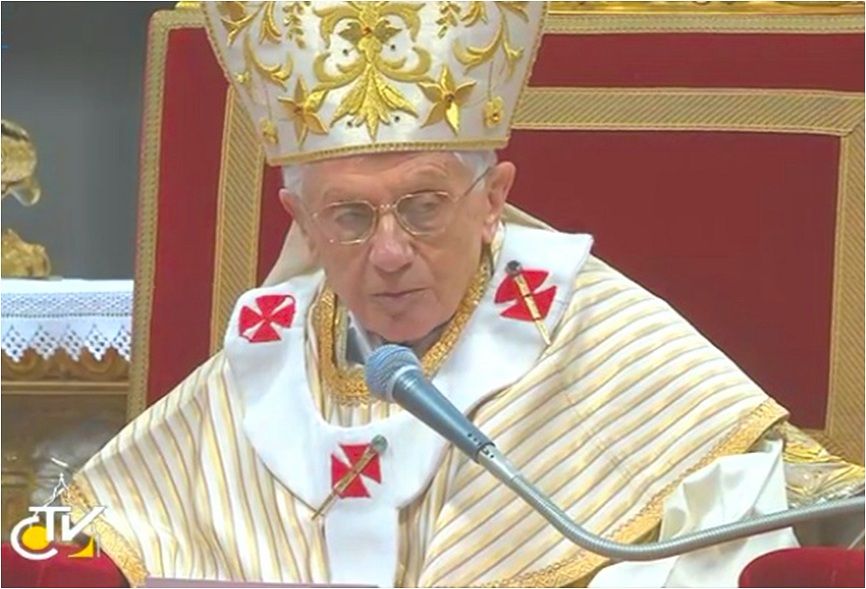
The ordination rite began with the chanting of the Veni, Creator Spiritus, after which the four candidate bishops prostrated themselves before the Altar of the Confession during the chanting of the Litany of Saints.
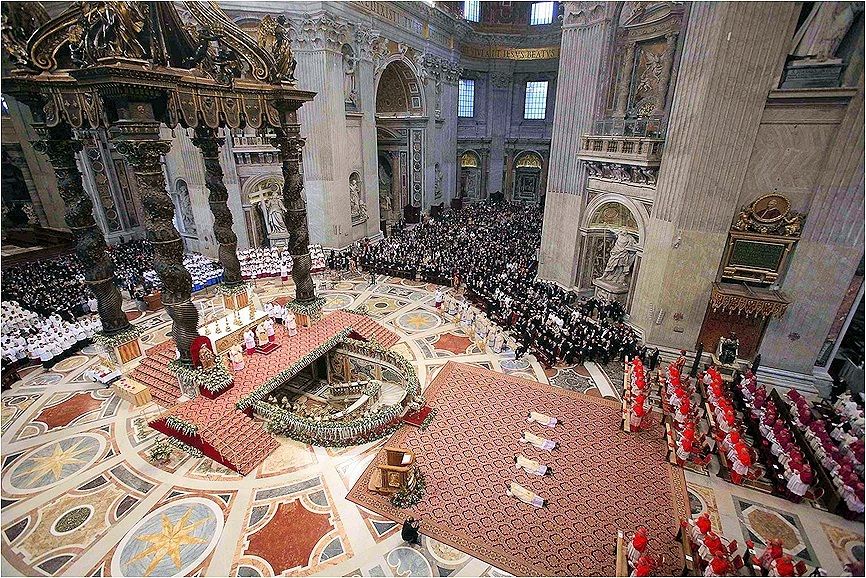
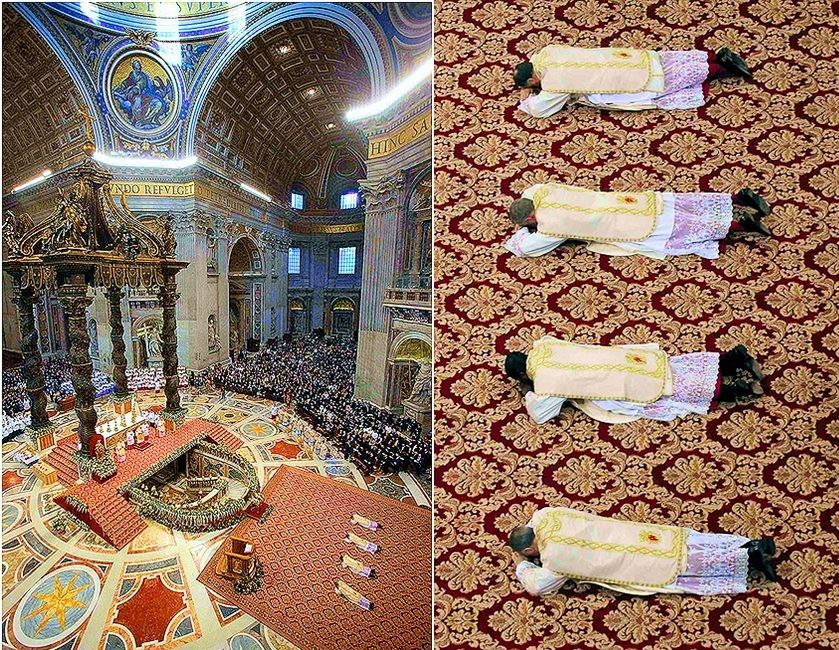
This was followed by the laying of hands on the ordinands, first by the Holy Father at the altar, and then by the two principal co-consecrators, Cardinals Bertone and Grocholewski, and all the cardinals and bishops present at the Mass.
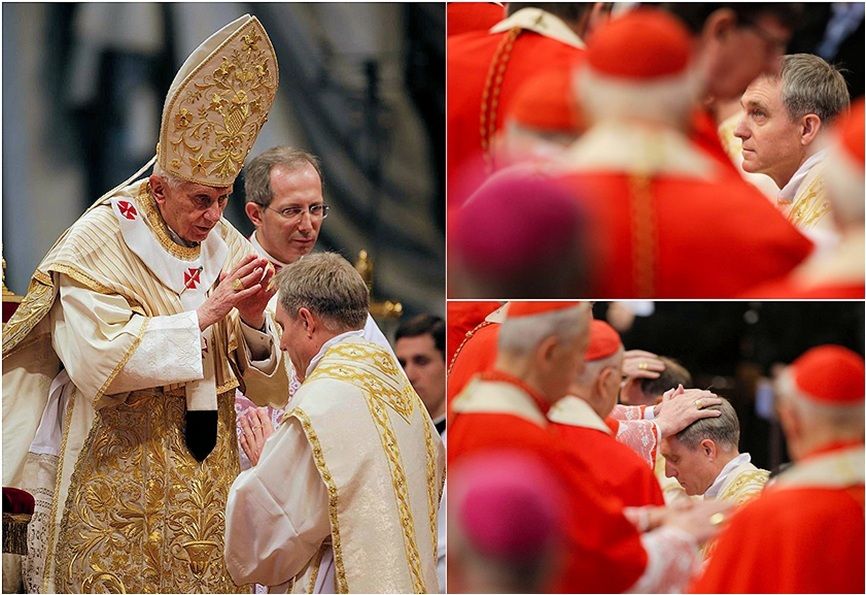
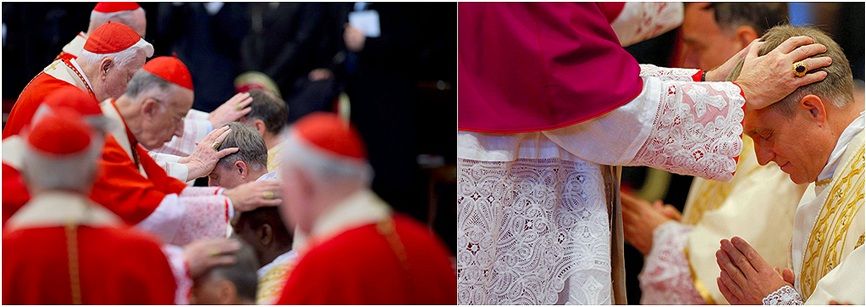
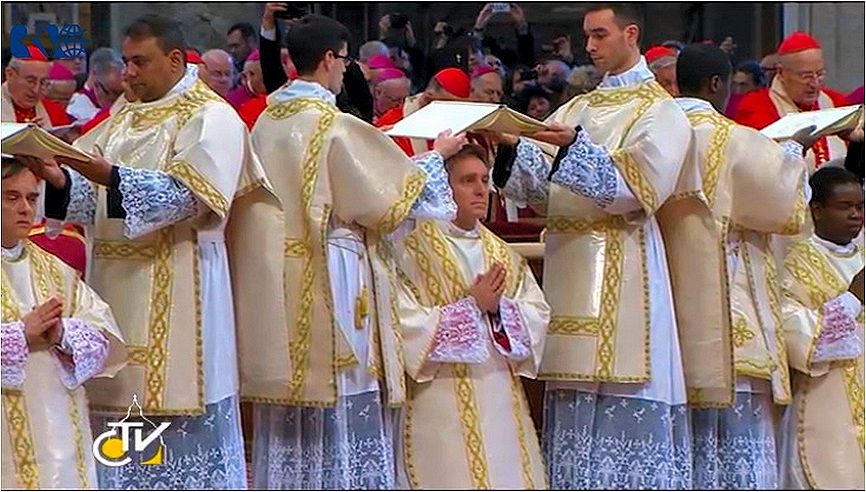
Next, the Gospel was laid over the heads of the ordinands.
Each candidate bishop then approached the Holy Father to be anointed with Chrism, and handed the Gospel, the bishop's ring, the miter and the crozier (pastoral staff).
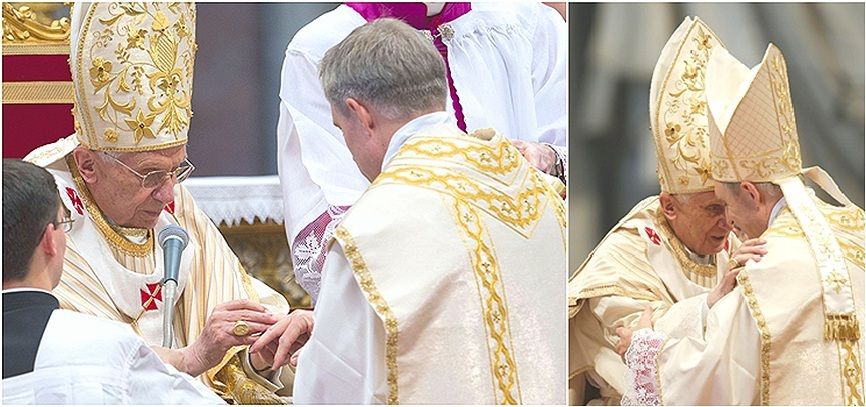
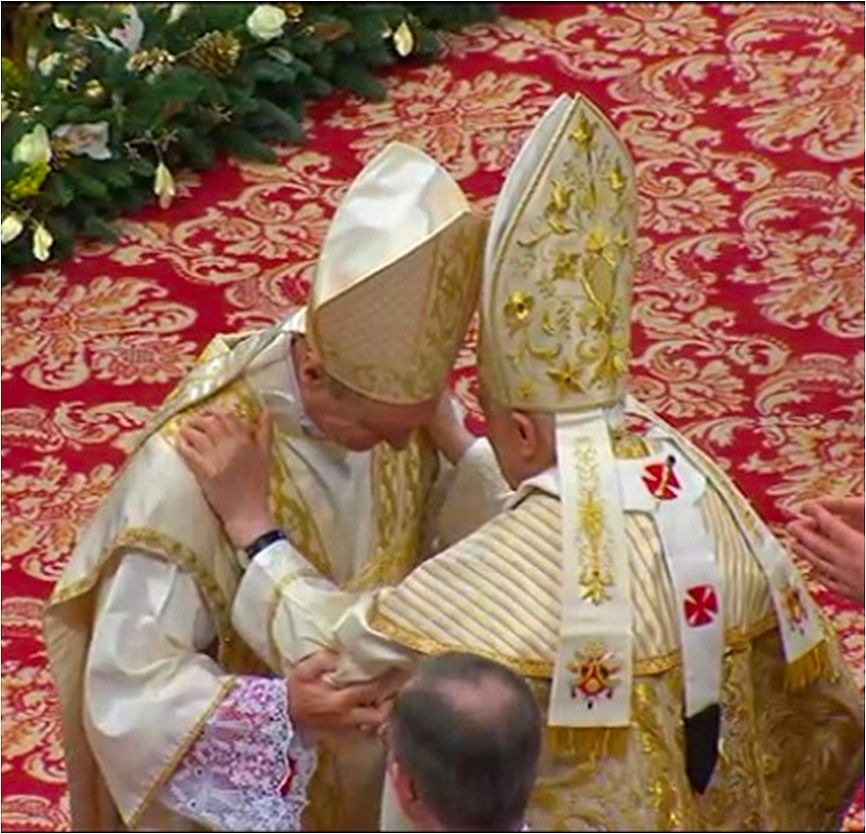
Now fully ordained, the new bishops are asked by the Pope to join him at the altar to concelebrate the Liturgy of the Eucharist.
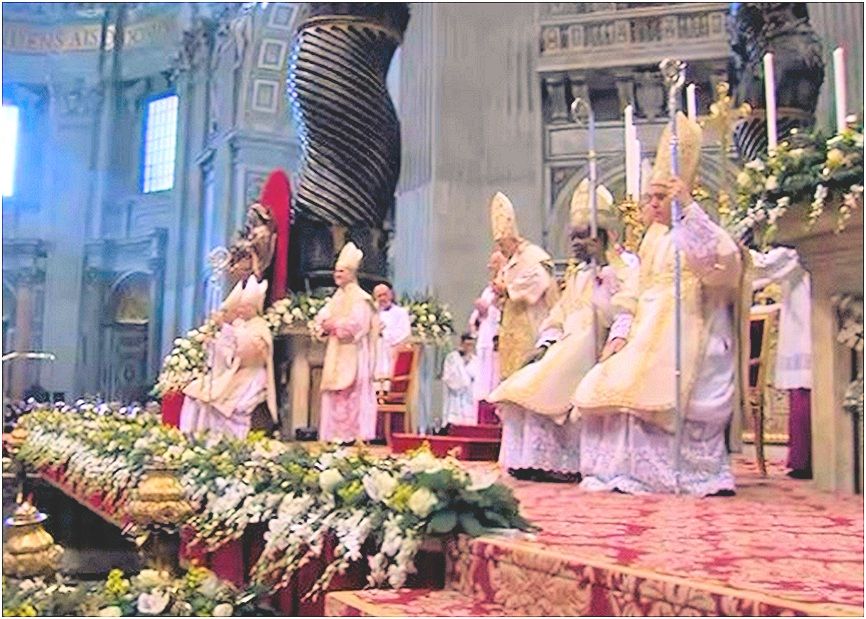
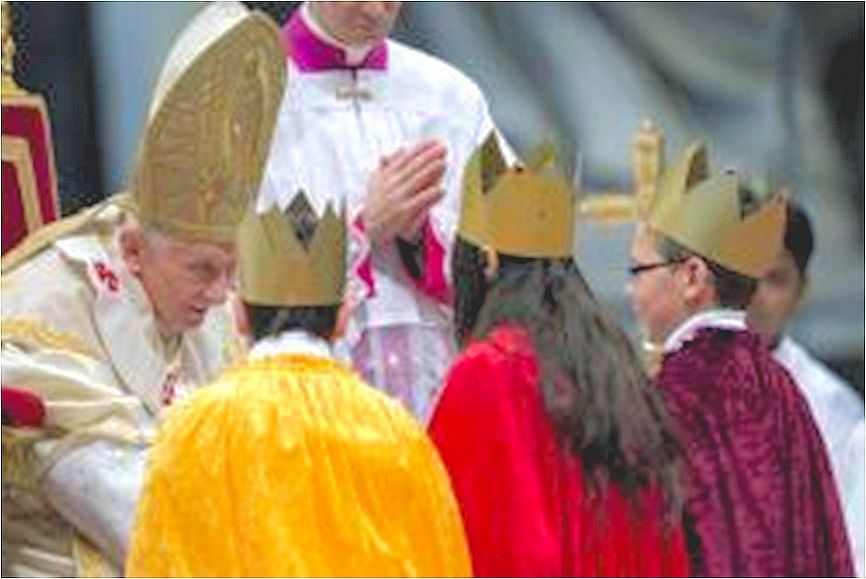

The new bishops go down to the nave to exchange the sign of peace with the cardinals and bishops present.
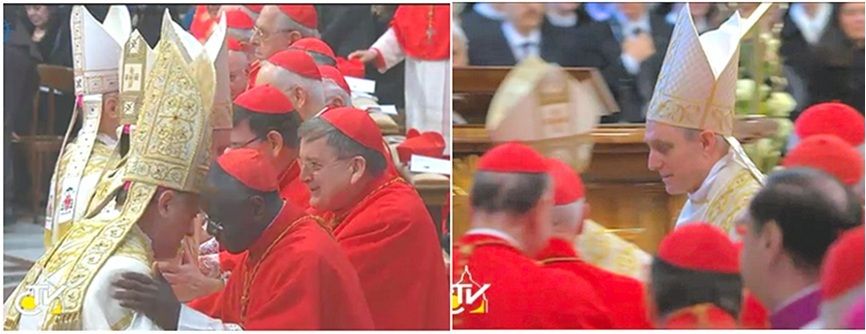 [Unfortunately, I have not found a photograph showing Mons. Gaenswein with the three bishops he specifically requested to be there for him. I thank Father Z for the videocaps he posted that portray important parts of the rite not otherwise represented in the newsphotos, and Vatican Radio for a couple of shots. As usual, however, we do not get all the important moments of the Mass. Nor are there any photos of the new bishops, wearing their miters and carrying the crozier, going down the central aisle of St. Peter's and back up again towards the altar to bestow their first episcopal blessings before the end of the Mass..
[Unfortunately, I have not found a photograph showing Mons. Gaenswein with the three bishops he specifically requested to be there for him. I thank Father Z for the videocaps he posted that portray important parts of the rite not otherwise represented in the newsphotos, and Vatican Radio for a couple of shots. As usual, however, we do not get all the important moments of the Mass. Nor are there any photos of the new bishops, wearing their miters and carrying the crozier, going down the central aisle of St. Peter's and back up again towards the altar to bestow their first episcopal blessings before the end of the Mass..
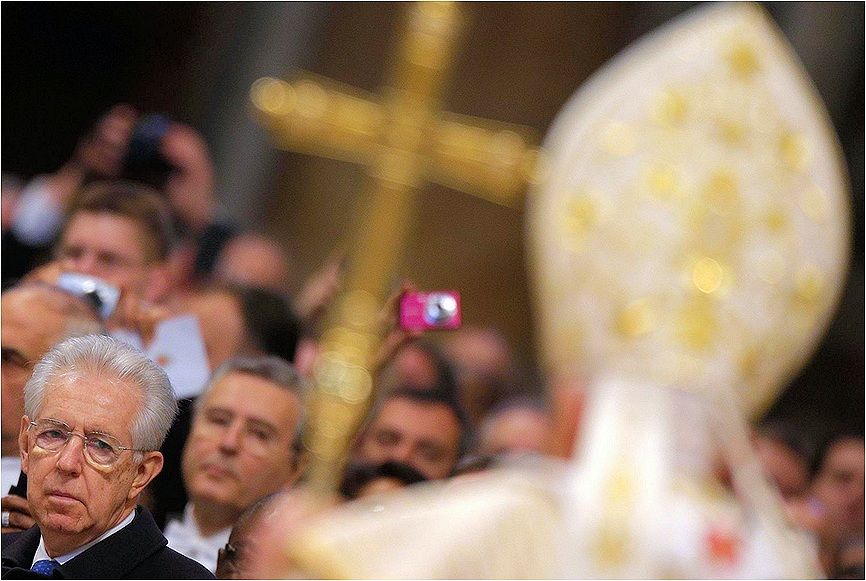 The last available newsphoto shows Italian Prime Minister Monti in the congregation, as the Holy Father leaves the altar.
Pope tells new bishops
The last available newsphoto shows Italian Prime Minister Monti in the congregation, as the Holy Father leaves the altar.
Pope tells new bishops
they must have the courage
to stand up to attacks

VATICAN CITY, Jan. 6 (Reuters) - Pope Benedict said on Sunday that Roman Catholic leaders must have the courage to stand up to attacks by "intolerant agnosticism" prevalent in many countries.
The Pope and the Church have come under increased attack because of their opposition to homosexual marriage and women priests.
[The way this is said, one would think the opposition was recent and topical, rather than fundamental and unchanging in the teaching and tradition of the Church. The Pope has repeatedly denounced what he says are attempts to push religion out of public debate.
The 85-year-old Pontiff celebrated Mass on the day Christians in the West mark the Epiphany, and ordained four new archbishops including his personal secretary.
In a homily to about 10,000 people in St Peter's Basilica in Vatican City, he firmly rejected suggestions the Church should change to suit public opinion.
"Anyone who lives and proclaims the faith of the Church is on many points out of step with the prevalent way of thinking," he said. "The approval of the prevailing wisdom, however, is not the criterion to which we submit."
In the United States, a group last month started a petition on the White House website asking the administration of President Barack Obama to list the Catholic Church as a "hate group" because of its opposition to gay marriage.
[Don't you just detest bigots like them? If anyone is a hate group, they are! They confuse a genuine article of religious faith for a judgmental opinion that amounts to an act ofdiscrimination by the Church hierarchy,]
"Today's regnant agnosticism has its own dogmas and is extremely intolerant regarding anything that would question it and the criteria it employs," the Pope said.
"Therefore the courage to contradict the prevailing mindset is particularly urgent for a bishop today. He must be courageous," he said.
The Pope ordained the new archbishops in a ceremony attended by Italian Prime Minister Mario Monti, placing his hands on the heads of the four men and anointing them with holy oil to symbolize the transmission of episcopal authority.
The best known of the four new archbishops is the Pontiff's chief private secretary Monsignor Georg Ganswein, who has been the closest person to Benedict since his election in 2005 as leader of the world's 1.2 billion Roman Catholics.
Last month Ganswein, 56, a German like the pope, was promoted to the job of Prefect of the Pontifical Household, a position
that will significantly increase his power as the Pope gets older and frailer. {That is a non sequitur, unless the writer assumes that an 'older and frailer' Benedict will leave all decisions to his subordinates as did the Parkinson-challenged John Paul II in the final years of his life! 'Older and frailer' does not automatically mean less able to exercise his mind and other faculties! Even considering the relatively minor role of media and public opinion a century ago, did anyone accuse Leo XIII in his final years - he lived to be 93 - of having been mentally incompetent?]
As prefect, Ganswein, 56 - already one of the most recognizable and powerful figures in the papal court - will arrange all the Pope's private and public audiences and his daily schedule.
[He's already been doing that, all these years, except that in the past, he had to coordinate with Mons. Harvey who was the Prefect of the Pontifical Household. Now, he only has to coordinate with himself! And although undoubtedly, the Pope asks his opinions about the affairs he must review with him daily as they work together, I don't think Gaenswein even considers himself an 'adviser' to the Holy Father! The secular media continue to attribute a predominantly secular mindset to the people who work with the Pope, i.e., that their main concern is to gain, consolidate and exercise power - that is an unwarranted assumption that is most unfair to honest priests and bishops just trying to serve the Lord and his Church in everything they do.]
And because he is expected to keep his job as chief private secretary, he will have even more power in deciding who has access to the Pope.
[Yada, yada, yada....]
Ganswein was
the immediate superior of Paolo Gabriele, the former papal butler who was convicted of stealing sensitive papal documents and leaking them to the media.
[He was not Gabriele's immediate superior (that would really be the Pope], but even if Gaenswein gave him minor tasks in the Pope's private office, technically, the valet staff is under the Prefect of the Pontifical Household (who, before Gaenswein, was not part of the 'papal family' living in the Pope's residence).
Gaenswein is obviously the senior member of the 'papal family' because of his seniority and rank, but no one has ever referred to him as the 'head' of the papal household staff. The Memores Domini are certainly not under his orders, and even if he is senior to the other private secretary, Mons. Xuereb, it's unlikely he treats him as a subordinate, but more as a peer, who like him, gets his orders from the Holy Father himself. All this further underscores how wrong it is for the media to keep referring to Gabriele as the 'butler' or 'majordomo' (literally, chief of the household) which gives him a supervisory household role he never had! He was the Pope's chief valet, after Angelo Gugel retired. Period. Just because he also served the Pope's meals did not make him majordomo!]
The secretary was the person who confronted Gabriele about papers that had gone missing. Gabriele was pardoned by the Pope last month after being sentenced to 18 months in jail for aggravated theft.
Because of the leaks scandal, Ganswein is expected to further tighten his control over Vatican personnel who have a direct connection to the papal apartments.
[His 'control' really has to do with if, when and how they get access to the Pope, with no supervisory power at all, except now, over the staff of the Pontifical Household.]
The other new archbishops are Angelo Vincenzo Zani, an Italian in the Vatican's department for Catholic educatio;, Fortunatus Nwachukwu, a Nigerian who becomes the Vatican's ambassador to Nicaragua, and Nicolas Thevenin, a [Genoa-based] Frenchman who becomes ambassador to Guatemala.
[Modificato da TERESA BENEDETTA 07/01/2013 04:56]